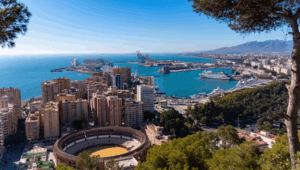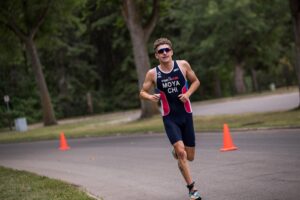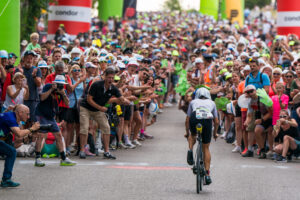Inside Rasmus Henning

Denmark has made a big imprint on the sport of triathlon for a country of 5.5 million residents. Rasmus Henning may be the Dane who has made the biggest splash by winning the first two $200,000 payouts at the Hy-Vee World Cups in Des Moines, but he is following in the accomplished footsteps of triathletes Marie Overbye, Peter Sandvang, Susanne Nielsen, and Torbjorn Sindballe. Taken together, the triathletes can stand tall among many other accomplished Danish sporting figures, who include: Tom Kristensen, 8-time winner of the LeMans 24-Hour automobile race; American football kicker Morton Andersen, the all-time NFL leading scorer; Tour de France winner Bjarne Riis and King of the Mountain cyclist Michael Rasmussen; 2008 World Series of Poker winner Peter Eastgate, European Tour golfer Thomas Bjorn; 800-meter track and field world record holder Wilson Kipketer; and Paul Elvstrom, universally regarded as the greatest sailor in Olympic history.
While outsiders may be more familiar with Shakespeare’s Prince of Denmark – Hamlet – Denmark has made a big imprint on modern arts and culture including: Fairy tale master Hans Christian Andersen, existentialist philosopher Soren Kierkregaard, novelist Karen Blixen, better known as Isak Dinesen, author of "Out of Africa"; pianist and humorist Victor Borge; great silent cinema director Carl Dreyer and modern directors such as Gabriel Axel (1987 Academy Award winner for "Babette’s Feast") Billie August (1988 Oscar winner for "Pelle the Conqueror") and Lars Von Trier (2000 Oscar nominated for "Dancer in the Dark"); actors Ana Karina, Brigitte Nielsen, Viggo Mortensen; and most popular, Lars Ullrich, drummer of the famed heavy metal band Metallica.
Located in northern Europe, Denmark is the southernmost, least wintry and flattest of the Scandinavian countries. Back in Viking Days, powerful King Canute ruled a kingdom that included large parts of Norway, Sweden and England. Now Denmark is a constitutional monarchy voted the second most peaceful and tied with New Zealand and Sweden as the least corrupt country in the world. It is also reputed to be one of the most environmentally sensitive countries anywhere, and its capitol Copenhagen was voted the second most livable city in the world. Denmark has one of the lowest jobless rates and highest degree of social programs and medical care anywhere. The cost of this utopian perspective is a high tax rate – 42 to 60 percent in personal taxes and an even higher rate on gas guzzling cars which prompted Henning to joke that if he took the Hummer he won at Hy-Vee home he would go broke.
In this interview, Henning talks about his family, his life at home near Copenhagen, and a thing or two about Denmark most outsiders don't know.
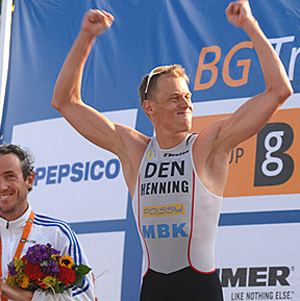
Slowtwitch: Tell me some things you have learned about life in your sporting career and in your personal life?
Rasmus Henning: I learned that athletes generally do very well in other parts of life. Especially athletes in areas I've been working with – triathlon and swimming — tend to do better in school education and working life. Success in racing and athletics create so many possibilities. Especially when they do it at a really high level and become a name people would know even fact you’ve been pursuing excellence in some area translates to advantages later in life
ST: What is the healthiest food you eat? What is worst food for you but something you still stubbornly have to have?
Rasmus: The best and healthiest food I eat is my wife Anita’s home-baked rye bread. She makes it out of sourdough and then adds different grains in it. It is magnificent. The least healthy? Ice cream. I love ice cream and I need to have some occasionally. Not every day. Once in a while I will go out and have some chocolate.
ST: What do you think about the fundamentalists fatwas (death threats) against Danish cartoonists who poked fun at Islam’s founder Muhammad?
Rasmus: I believe very much in freedom of speech, thought and religion. Still, I think the newspapers that printed those should have thought more about the people they offended. As they were presented, those cartoons were more an act of disrespect. In general, I do not see printing the cartoon as illegal. But I feel they should have thought more about it. I think they might have crossed some invisible borders of disrespect. Generally I think printing them was a bad idea.
ST: Have you ever read “Hamlet,” who is the Prince of Denmark in Shakespeare’s classic tragedy?
Rasmus: I’ve never read it and I don’t think I have even seen a movie of it nor performed in the theater. It is probably a lack in my cultural background. I should have seen it. But it is not as big in Denmark as it might be in other places. It is not a compulsory part of education in Denmark.
ST: What about Danish novelists like Isak Dinesen, who wrote “Out of Africa,” and Peter Hoeg, who wrote the mystery “Smilla;s Sense of Snow?” by
Rasmus: My mum is Swedish, and I very much like Swedish literature and movies. I am a fan of Swedish writer Jan Guillou. He has done a trilogy that takes place in the 12th century in middle Sweden. It’s about a boy named Arn growing up to become man. He is the son of a medieval man who owns a lot of land and has his own army and is very loyal to the King. When Arn grows up he is strong with the sword, very good in archery and also very intelligent in strategy to develop the country. He goes as a Temple Knight to the Holy Land and fights the Arabs. After serving a number of years, he returns to Sweden and takes home with him a lot Arab culture. He tries to take inspiration from people around him who are able to do things he cannot and he brings them back to make his kingdom stronger, which to me a very good and admirable thing.
ST: Do you have favorite movies?
Rasmus: I actually like Swedish movies the best. I liked Lasse Hallstrom’s “My Life as a Dog.” But my favorite Swedish movie might be “Angel Farm,” which came out last year. It’s directed by Colin Nutley, a Briton who lives in Sweden. The movie is set in contemporary, rural Sweden in a place so conservative it resists many changes in modern life. When a young women inherits a big farm, she refuses to sell it to another farmer and decides to move there out of stubbornness and bring her urban friends. They influence local society which had remained the same for decades. It is very interesting to see how some of locals liked the new ways but were stuck in their old way of living. I think it was very good and very relevant in our time.
”Angel Farm” was critically roasted upon its release in 2008
ST: Ever see the 2004 movie “The Prince and Me” starring Julia Stiles as a Wisconsin student who meets a Danish prince, who persuades his Royal family to accept a commoner bride? It was actually based on Prince Frederik, who married an Australian commoner.
Rasmus: I heard about that once but I have not actually seen it.
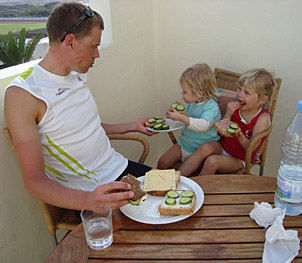
ST: What are the best things about Danish society and government?
Rasmus: I like the fact that in general in Denmark the government takes care of everybody. We don’t have that many homeless people, we don’t have that many poor people, and we have a very strong social safety net. There is not a huge difference between rich and poor that exists in other countries. We pay a lot in taxes, which is tough when you suddenly win $200,000 and a Hummer at Hy-Vee. But we have free health care, free education no matter what social or economic background. So it is still possible to go to university and get medical treatment when you get sick. I appreciate those things.
ST: What is the worst thing about Danish society?
Rasmus: The biggest problem is that despite being such a rich country and such a well-functioning country there still are a lot of people on the government level who want to exclude a lot of foreign influences. The Danish People’s Party is quite big and it’s a very right wing party which has a big influence over government in the last 10 years or so. They are very powerful and they are very much against any kind of immigration. They also limit the possibilities to marry someone outside of the European Union. Some of the immigration laws they support are crazy. To become a Danish citizen you need to be able to make a summary of Hamlet – and 80 percent of the Danish population are not able to do that. If you do not pass the test, you do not get citizenship, even if you have lived here many years and have a job. I think we need to be a bit more open minded and look at what is good for the country as a whole.
ST: Any thoughts about the Danish monarchy?
Rasmus: The Danish monarchy is very expensive. Taxpayers pay a lot of money every year to support it. On the other hand, it is a big marketing asset to the country. They visit a lot of countries and promote tourism, Danish culture and business very well.
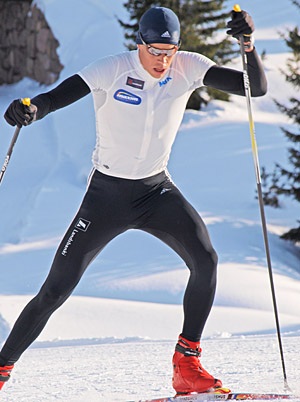
ST: Have you met the royals?
Rasmus: In the Olympics I met the whole royal family and I am on a first name basis with Crown Prince Frederik. He is running for a spot on the International Olympic Committee and he will probably be elected to join the IOC Commission later in this year. He will go “Hey, Rasmus how are you doing?” And I will say “Hello Frederik, how are you?” He is nice and I appreciate that I do not have to stand there in a tuxedo in big royal halls to meet him. I met him, at the Olympics at our Olympics committee. He is a very well-spoken guy and made a good impression with his appearances at the Olympics. At the opening ceremony he and Crown Princess Mary waved at us from the grandstand, and that was very much appreciated.
ST: What is the biggest misconception outsiders have about Denmark?
Rasmus: The biggest misconception is that many people think Denmark is a winter country high in the mountains and there is snow everywhere. People think I will be skiing in the winter season. But we are very flat and are surrounded by water and do not get cold inland climate. In fact we only get snow a few weeks every winter. We hardly ever get enough snow to ski. Actually we can ride on the roads through the winter. We only have to go inside less than 5 times every year.
ST: What historical figure in Danish history most intrigues you?
Rasmus: I think it is interesting that in Viking times about 1000 years ago Denmark actually ruled a big part of northern Europe – part of Sweden, all of Norway and a big part of England at that time were under Danish sovereignty. There are remains of Danish language in some dialects of the British Isles. That is quite interesting. The leader at the time was King Canute, who ruled the biggest area of Denmark.
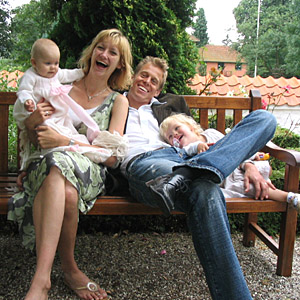
ST: Are you religious or spiritual? According to a national survey, approximately 49 percent of Danes either believe in God or a spiritual being.
Rasmus: I am not really religious. I like to see myself as an ethical person. I like to treat other people with respect and expect the same from others. But I do not believe in a greater God or a thing like that. I am probably more scientific in my approach to human life.
ST: Tell us what you are learning about life with your children.
Rasmus: I have two daughters, Emilie is two and Caroline is three and a half years old. I've learned to cherish the time I had to myself as my time and cherish the time with them as time together. When I go out training I appreciate it even more because it is my time when I can concentrate and think about my sport and the things that I want to fill my head with. When I come home I am no longer Rasmus the athlete, I am Rasmus the father and I try to be completely present.
ST: What do you try to teach them?
Rasmus: I try to teach them to be good to each other and to other people, and to be open minded. My oldest daughter is in kindergarten and already starts to be quite girlish and looks at girl colors and boy colors. She does not want to wear pants, she wants to wear dresses and be a little princess. I try to tell her it can be a good thing to wear pants and wear blue and boy colors some times, also. I would like them to be more tolerant of everything. I like to inspire them to be outgoing, not to hold back. I’d rather have them fall off their bike while trying to ride than not trying to ride. I’d rather have them spill their food on the floor than not try to eat it themselves.
ST: What sorts of songs do you hear in your head while swimming – biking running in a hard race?
Rasmus: I have songs all the time in my head. It might be a song on the radio that gets stuck in there and I can hear it over and over all through the day. One that comes to mind is “The Final Countdown” by Europe. It’s a sing from the ‘80s. It’s a rock song in the line of Guns and Roses, very melodic with good rhythm. It can really drive you to push hard the whole workout or race.
(You can hear it at this address on You Tube)
http://www.youtube.com/watch?v=0ZkllM8znx4
ST:What irritates you the most?
Rasmus: I really dislike it when people don’t do what they promise. I really dislike it if someone makes an appointment or says they will do something and they fail to do it. I try to keep my word and my promises and be loyal to people around me. I can keep a secret and if I tell people I will do something and cannot, I will tell them in advance instead of keeping people waiting.
ST: What small thing in life makes you happiest?
Rasmus: When I've been away a little time from my kids, I come to either pick them up at kindergarten or come home now been away two days as soon as I get into my house they come running to me with open arms and big smiles on their faces “Hey daddy we missed you!”
ST: What is the best cafe in Copenhagen?
Rasmus: With two little kids we don’t really go out that much. But sometimes if reporters interview me or some guests arrive from out of town we have a restaurant in Farum near the Danish training center where I go for lunch at times. It’s called Tante Maren, which means Aunt Mary. My favorite thing on the menu is Paris Steak. It’s mincemeat hamburger on nice toasted bread, and raw egg on top and onions and little cloves.
ST: What is the coolest thing a tourist should try to see in Denmark that may not be in all the guidebooks?
Rasmus: Just take the time to go for a hike in one of the big forests in late spring. They are very big beech forests around the area near Copenhagen where we live with lots of light in there. We live close to a place called the Rude Forest, which is pronounced quite differently than the English word for inconsiderate social behavior.



